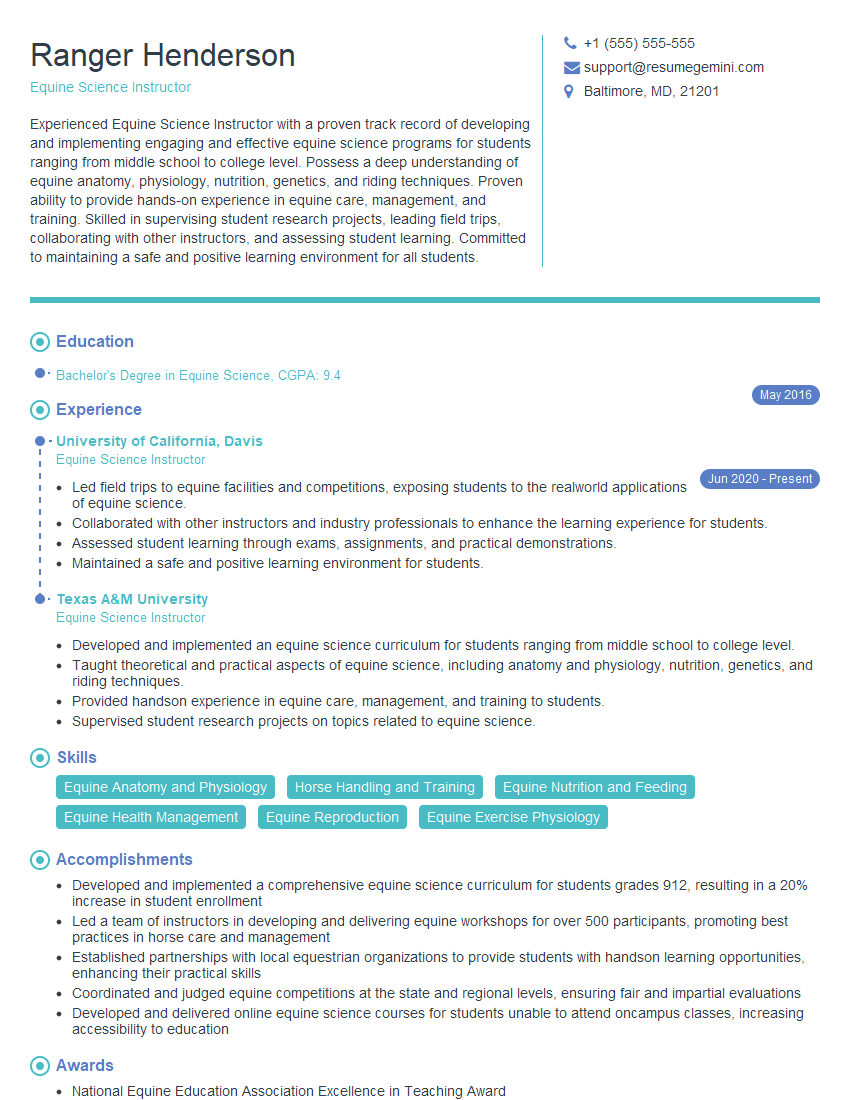Are you a seasoned Equine Science Instructor seeking a new career path? Discover our professionally built Equine Science Instructor Resume Template. This time-saving tool provides a solid foundation for your job search. Simply click “Edit Resume” to customize it with your unique experiences and achievements. Customize fonts and colors to match your personal style and increase your chances of landing your dream job. Explore more Resume Templates for additional options.

Ranger Henderson
Equine Science Instructor
Summary
Experienced Equine Science Instructor with a proven track record of developing and implementing engaging and effective equine science programs for students ranging from middle school to college level. Possess a deep understanding of equine anatomy, physiology, nutrition, genetics, and riding techniques. Proven ability to provide hands-on experience in equine care, management, and training. Skilled in supervising student research projects, leading field trips, collaborating with other instructors, and assessing student learning. Committed to maintaining a safe and positive learning environment for all students.
Education
Bachelor’s Degree in Equine Science
May 2016
Skills
- Equine Anatomy and Physiology
- Horse Handling and Training
- Equine Nutrition and Feeding
- Equine Health Management
- Equine Reproduction
- Equine Exercise Physiology
Work Experience
Equine Science Instructor
- Led field trips to equine facilities and competitions, exposing students to the realworld applications of equine science.
- Collaborated with other instructors and industry professionals to enhance the learning experience for students.
- Assessed student learning through exams, assignments, and practical demonstrations.
- Maintained a safe and positive learning environment for students.
Equine Science Instructor
- Developed and implemented an equine science curriculum for students ranging from middle school to college level.
- Taught theoretical and practical aspects of equine science, including anatomy and physiology, nutrition, genetics, and riding techniques.
- Provided handson experience in equine care, management, and training to students.
- Supervised student research projects on topics related to equine science.
Accomplishments
- Developed and implemented a comprehensive equine science curriculum for students grades 912, resulting in a 20% increase in student enrollment
- Led a team of instructors in developing and delivering equine workshops for over 500 participants, promoting best practices in horse care and management
- Established partnerships with local equestrian organizations to provide students with handson learning opportunities, enhancing their practical skills
- Coordinated and judged equine competitions at the state and regional levels, ensuring fair and impartial evaluations
- Developed and delivered online equine science courses for students unable to attend oncampus classes, increasing accessibility to education
Awards
- National Equine Education Association Excellence in Teaching Award
- American Quarter Horse Association Outstanding Youth Mentor Award
- Equine Science Institute Grant Recipient for Equine Nutrition Research Project
- National FFA Proficiency Award in Equine Science
Certificates
- Equine Science Certification (ESC)
- Certified Veterinary Technician (CVT)
- Certified Animal Welfare Administrator (CAWA)
- Certified Horsemanship Association (CHA) Instructor
Career Expert Tips:
- Select the ideal resume template to showcase your professional experience effectively.
- Master the art of resume writing to highlight your unique qualifications and achievements.
- Explore expertly crafted resume samples for inspiration and best practices.
- Build your best resume for free this new year with ResumeGemini. Enjoy exclusive discounts on ATS optimized resume templates.
How To Write Resume For Equine Science Instructor
- Highlight your passion for equine science and your ability to engage students in the subject matter.
- Showcase your experience in developing and implementing innovative equine science programs.
- Demonstrate your skills in providing hands-on experience in equine care, management, and training.
- Emphasize your commitment to student success and your ability to create a positive and supportive learning environment.
- Include any relevant certifications or professional development coursework that you have completed.
Essential Experience Highlights for a Strong Equine Science Instructor Resume
- Developed and implemented an equine science curriculum for students ranging from middle school to college level.
- Taught theoretical and practical aspects of equine science, including anatomy and physiology, nutrition, genetics, and riding techniques.
- Provided hands-on experience in equine care, management, and training to students.
- Supervised student research projects on topics related to equine science.
- Led field trips to equine facilities and competitions, exposing students to the real-world applications of equine science.
- Collaborated with other instructors and industry professionals to enhance the learning experience for students.
- Assessed student learning through exams, assignments, and practical demonstrations.
- Maintained a safe and positive learning environment for students.
Frequently Asked Questions (FAQ’s) For Equine Science Instructor
What are the educational requirements to become an Equine Science Instructor?
Most Equine Science Instructors have a Bachelor’s Degree in Equine Science or a related field.
What are the key skills and qualities of a successful Equine Science Instructor?
Key skills and qualities include a deep understanding of equine science, strong communication and interpersonal skills, and the ability to create a positive and supportive learning environment.
What are the career opportunities for Equine Science Instructors?
Equine Science Instructors can work in a variety of settings, including colleges and universities, vocational schools, and private riding academies.
What is the job outlook for Equine Science Instructors?
The job outlook for Equine Science Instructors is expected to be good over the next few years.
What are the salary expectations for Equine Science Instructors?
The salary expectations for Equine Science Instructors vary depending on their experience and level of education.
What are the benefits of working as an Equine Science Instructor?
Benefits of working as an Equine Science Instructor include the opportunity to work with horses, share your knowledge and passion for equine science, and make a positive impact on the lives of students.
What are the challenges of working as an Equine Science Instructor?
Challenges of working as an Equine Science Instructor include the physical demands of the job, the need to stay up-to-date on the latest equine science research, and the potential for working with difficult students.